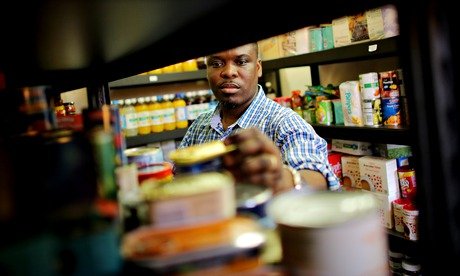This Lent I will eat no food, to highlight the hunger all around us
Fasting can point the way to a greater compassion and help us demand that something be done to end food poverty in Britain.

Lent this year begins on 5 March. From that day until Palm Sunday I'm not going to eat any food. I'll have a glass of fruit juice in the morning, some vegetable stock in the evening and make sure to keep hydrated but otherwise I won't be eating anything at all. This will be a time of study, prayer, my regular work and attempting to highlight the growing crisis of hunger in the UK.
A person going without food in Britain is not new but, for some reason, it's only just becoming news. According to Oxfam half a million people accessed a food bank in the past year, and those I've met who have used them – and those who refer them in the first place – confirm that by the time people get to a food bank they've often already missed several meals.
The gap between rich and poor has grown under both Labour and coalition governments, so what has changed a sad state of affairs into a crisis? More than 13 million people live in poverty in the UK, and up to 3.5 million of these are children. Many are now dependent on food aid, relying on a rapidly expanding network of food banks and support programmes. A survey for the parenting website Netmums found that one in five mothers reported regularly skipping meals to better feed their children and 5,500 people were admitted to hospital in the UK for malnutrition this year compared with 3,000 in 2008.
The massive growth in the numbers going hungry has been fuelled by many things. There have been rapidly rising food prices (up 30.5% in the past five years), stagnant and falling real incomes, unemployment, the casualisation of work, and capping increases in benefits to 1% rather than indexing them to inflation. The incompetency and reform of the benefit system has also contributed to the problem – 30% of those visiting food banks do so because their benefits have been delayed.
I spoke last week to a father who had brought his daughter to a food bank in desperation. She had moved in with her partner, with whom she had a child. The child's father was stuck in a job with no prospects, and so quit his secure dead end job to follow up a new job offer. It sounds like a can-do Britain dream: here's a young fellow taking responsibility for "bettering himself". Only it didn't work out that way: the new employer dropped him after a probationary period and the DWP cancelled his partner's benefits, without warning. The reason given for this sanction was that her partner had quit his job.
When we launched End Hunger Fast, critics were queuing up to tell us we'd got it all wrong and that the benefits system was broken and had to change: which is odd, because, that's basically what we're saying too. We have three requirements of the government and we're willing to help it achieve them. We need:
1. Welfare that works for the most vulnerable.
2. Work that pays so we can get people out of in-work poverty.
3. A food market that puts people before profits.
None of our requirements are leftwing or rightwing because everybody wants a welfare system that works and everyone wants full employment. And who can argue that food prices rising so rapidly isn't something that the government needs to look at urgently?
Fasting is practised by many religions, in many different ways. In the Christian tradition, rooted in its Jewish cousin's practices, fasting has a strong and regular role in bringing the individual to a place where they understand their complicity in an unjust system and where they draw closer to God and to their neighbour. Well, our neighbour is hungry (in my case that is literally true, I've just discovered someone's been sleeping in our garden this week).
When Jesus began his ministry of liberation for the poor and dispossessed he spent 40 days in the wilderness and fasted. In these stories, fasting was not a stunt but rather a sign. Fasting can point the way to a greater compassion and help us demand that something be done to stop this crisis in its tracks. This is why we're inviting you to join us by signing up to a National Day of Fasting on 4 April by registering at endhungerfast.co.uk. We can all help: whether you are spiritual, religious, or just that wonderful thing called "human".


 Votes : 0
Votes : 0









